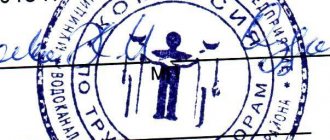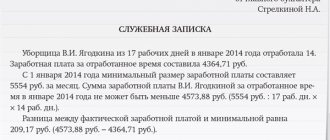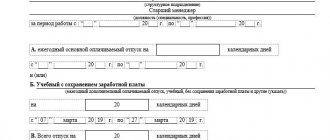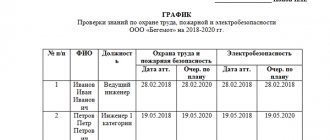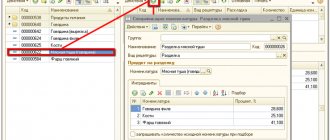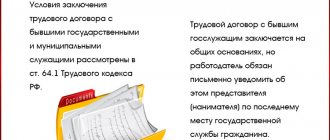Sample order on violation of labor discipline
09 October 2020 at 15:01 An order for violation of internal labor regulations is a natural reaction of the employer to ignoring labor discipline, which regulates the requirements for the behavior of employees at the enterprise. We can even talk about an employee’s insignificant, at first glance, misconduct, for example, using the work Internet for personal purposes. Related articles Table of contents If you find an error in the text, please let us know by highlighting it and pressing Ctrl+Enter. The employer has the right to punish the offending employee for violating the requirements established at the enterprise, including being late for work.
The penalties available to the employer against an employee who has violated discipline are contained in. Among them:
- make a remark;
- reprimand;
- warn about possible dismissal.
For some employees, separate regulations relating to labor activities provide for other disciplinary sanctions. According to Art. 15 Federal Law “On the Constitutional Court of the Russian Federation” dated July 21, 1994 No. 1-FKZ, there are certain types of disciplinary sanctions for judges of the Constitutional Court:
- warning;
- termination of powers.
The employer will have to formalize his decision in the form of an appropriate order.
For example, using . But the employer does not have the right to issue an order that obliges the guilty employee to pay safety regulations or labor protection requirements, since the Labor Code of the Russian Federation does not provide for such a penalty.
Violation of labor discipline
In order for employees to maintain discipline, the process of being late cannot be left to chance. Each case of arriving at work later than the established time must be recorded, documented and resolved accordingly. Only in this way will employees understand the seriousness of the situation with delays.
A member of the workforce being late for the start of the production process must be formalized as follows:
- An act of being late for work is drawn up. A sample of this document is given below. This act is drawn up by the immediate supervisor of the violator, and it is signed by those present at the fact of the violation of discipline. Certificate of being late for work sample
- The late employee must write an explanatory note containing information about the reason for the violation. If an employee avoids a written explanation of the reason for being late, a report on this matter is also drawn up, but with a different content.
- An explanatory note for being late for work can be supplemented with a supporting document, if available. Evidence confirming the presence of a valid reason for an employee’s delay may be a certificate from the housing office about the accident, a sick leave certificate, a certificate from the traffic police, any certified medical document (certificate, referral, conclusion), a photograph of the reason for the delay, a transport ticket with a note about the flight delay, a summons and so on.
- The head of the enterprise, in the process of familiarizing himself with the supporting documents, makes a decision on the further fate of the offender. If the boss decides that the reason for being late was valid, then the employee’s life will proceed as usual until the next violation. If the presented excuses do not satisfy the management, then punishment will be applied to the violator.
- The employer issues an order regarding the unscrupulous employee being late for work and the penalty for this violation. Within three days, this document must be provided to the employee for review and signature. If the employee categorically refuses to familiarize himself with the document, a corresponding act signed by witnesses is also drawn up. Order about being late for work sample
Showing up at the workplace later than the established time is a disciplinary offense, and, accordingly, punishment for being late to work can only be disciplinary. Can you be fired for being late? Quite, but the punishment must correspond to the gravity of the offense. These measures include:
- Giving the offending employee a reprimand. This measure is considered the easiest and is applied for the first violation.
- Reprimanding the offender. This type of penalty is applied when an employee is repeatedly late for work.
- Dismissal of an employee from the company's staff. An extreme disciplinary measure is applied when an employee is regularly, unreasonably, long late for the start of the production process. Employees who are frivolous about their work schedule should know that gross violations, including being late, can result in dismissal. The employer makes the decision to dismiss an employee personally. He has such a right, but not an obligation.
We invite you to read: Expired traffic fine: what to do, how and where to pay an overdue fine, what will happen for a late fine.
The law establishes that only one penalty is applied for one violation. It is prohibited to apply different types of punishment for one violation.
Disciplinary action must be applied to the violator within a month, but no later than six months. This period does not include the time the employee is absent from the workplace due to illness, vacation or other reasons.
If during the year the employee has no other cases of violation, then the defamatory fact is deleted from any records. The employee is considered to have no penalties at all.
Despite the seriousness of the offense, the head of the enterprise does not have the right to collect a fine for violation of labor discipline, including for being late. This provision is regulated by the Labor Code of the Russian Federation. Withholding funds violates the employment contract and the rights of the employee. For applying this penalty, the head of the organization may face administrative punishment.
If every case of lateness for work by members of the work collective is recorded, investigated, suppressed and punished, then there will be no problems with the observance of labor discipline in this organization. Drawing up various kinds of documents and acts is necessary if a conflict between the parties is submitted for trial to the labor inspectorate or court.
When hiring an employee, the director must familiarize him with the PVTR against his signature. By signing the document, a person undertakes to follow the specified requirements and comply with the rules of labor discipline. In case of neglect of the rules, the employee is responsible for the offenses committed. And the employer has every right to take disciplinary action against him.
According to Art. 21 of the Labor Code of the Russian Federation, the employee is obliged to:
It is believed that if an employee violates at least one of these points, he has violated labor discipline. Each violation entails the collection of supporting documents and an investigation. If the citizen’s guilt is proven, the employer may impose penalties on him.
As a punishment for misconduct, the employer has the right to punish the offending employee. For example, if an employee came to work later than expected. The penalties that an employer has the right to apply to an employee if he has violated discipline are contained in Art. 192 Labor Code of the Russian Federation. Let's list them:
- rebuke;
- comment;
- dismissal.
We suggest you read: Hiring a pregnant woman
For some employees, certain regulations relating to labor activities may provide for other disciplinary sanctions. So, according to Art. 15 Federal Law “On the Constitutional Court of the Russian Federation” dated July 21, 1994 No. 1-FKZ, a disciplinary sanction may be imposed on a judge of the Constitutional Court in the form of:
- warnings;
- termination of powers.
The employer must formalize his decision in the form of an appropriate order. For example, issue an order to reprimand the offending employee.
But the employer does not have the right to issue an order on fines for violation of labor discipline in relation to the guilty employee, since the Labor Code of the Russian Federation does not provide for such a disciplinary measure.
To apply disciplinary action, you must adhere to the following algorithm:
- draw up a report of lateness;
- require an explanatory statement from the employee;
- if the violation of labor regulations is not justified by a valid reason, draw up a sample order in a reprimand (remark) for being late for work;
- familiarize the employee with the document against signature.
The order must contain the following points: date and place of preparation, full name and position of the employee, the essence of the violation, the basis for the offense, the signature of the manager.
An order to punish for being late may imply not only a reprimand, but also dismissal, but only if the employee already has an outstanding disciplinary sanction. Please note: the penalty must be applied within a month after discovery of the fact of lateness and no later than six months after the offense.
In addition, before issuing an order for disciplinary action, it is important for the employer to carefully and seriously approach the registration of the fact of an offense. It will be necessary to record the moment the employee is absent from the place where he performs his work function and find out all the circumstances of this violation.
This is possible by issuing a separate document drawn up by a commission specially created by the employer. If an employer's order to impose disciplinary action is announced without following these procedures, the disciplinary action may be challenged in court or escalate into an endless legal battle between the employee and the employer.
We invite you to read: Reduction of civil servants: what can those laid off expect?
In order for the employer to be able to punish the employee for labor misconduct, care should be taken in advance to ensure that all the duties that the employer expects the employee to perform are familiarized with in a timely manner and signed.
In order to correctly document an employee’s misconduct, the employer needs to follow the algorithm of actions indicated below: Compile it with the signatures of two fellow witnesses who can confirm the fact of the misconduct. Let's take it. The document must be provided within two days.
If a person does not want to explain his misconduct, draw up an act of refusal to give a written explanation and sign the presented act. After this, the director sets a date and time for the debriefing, to which all involved persons are invited. If the employee’s guilt is proven, it should be issued, which will indicate the sanctions applied to the violator.
We introduce the order to the employee against his signature.
If he refuses the request to sign the order, a corresponding act must be drawn up. It is signed by 3 witnesses.
According to the law, an employer’s order to impose a disciplinary sanction is announced if two conditions are met.
Firstly, the fact of committing an offense must be recorded in the form of an act and/or a report. Secondly, an explanation of what happened in writing must be received from the employee. If the explanatory note, in the opinion of management, does not contain valid reasons, the personnel service begins to draw up an order.
The sample order for imposing a disciplinary sanction is not determined by law. A correctly executed document contains:
- an indication of three working days as the period for familiarization with the order.
- indication of the penalty;
- a brief description of the offense;
- link to article 192, 193 Labor Code of the Russian Federation;
As an example, we offer a sample order for disciplinary action for absenteeism. Subscribe to our channel on Telegram We will tell you about the latest news and publications.
Order on punishment for being late for work sample 2020
For example, after several comments, the dismissal of the offender may follow.
Dismissal is the most serious measure that an employer takes in relation to a subordinate who is regularly absent from work without good reason. Is it possible to fire a pregnant woman for absenteeism? For each type of violation of labor discipline at enterprises, appropriate standards have been established, which are regulated and supplemented by the Labor Code of the Russian Federation.
The employer may take disciplinary action against the violator in the form of:
- reprimand;
- dismissals.
- comments;
The matter is limited to a reprimand if a person first violated the rules of work ethics and allowed absenteeism from work. The employer is deprived of the right to collect sums of money from employees as a fine for disciplinary actions. But you can often hear that one or another action of an employee, regarded as a violation of labor discipline, was punished with a fine. but it's illegal, you say.
it's not quite like that. A fine means other actions that, although they incur financial losses for the guilty person, are, in fact, not a fine. alt=”Order on punishment for being late for work sample” Contents: What punishment will follow for being late for work In order to correctly document the employee’s misconduct, the employer needs to follow the algorithm of actions indicated below: We draw up with the signatures of two fellow witnesses who can confirm fact of misconduct.
Let's take it.
Order about being late for work: a sample of a reprimand for violation of labor discipline; is it possible to impose fines on an employee for arriving late to work?
This will become a strong argument in favor of the employer in the event that an employee decides to sue in connection with a violation of his rights.
The offending employee is given two working days to provide an explanation. If this does not happen within this time, then an act is drawn up recording the refusal to provide any explanations.
- An order for disciplinary action must contain the following information:
- The document must be certified by the signatures of witnesses.
- The report must indicate that the demand for explanations was received by the offender, but there was no response from him.
Moreover, it must be remembered that only one type of penalty can be imposed for one offense. Not all employees of the organization in which this or that offense was committed can impose a disciplinary sanction, that is, sign an order regarding it.
Article 192 of the Labor Labor Code clearly limits the list of measures for punishing workers: Each measure must be correctly formalized and have grounds for its application.
Since they are listed in accordance with the measure of severity, they are used in the following cases:
- a remark is the mildest impact, when it is necessary to indicate in writing any violations of production or labor discipline;
- reprimand - a more severe punishment for the same or more serious offenses;
- dismissal at the initiative of the employer is a last resort for violators.
Each penalty must be drawn up in accordance with the requirements of the law. The absence of an explanatory note does not prevent the employee from being punished.
Disciplinary procedure
For committing a disciplinary offense, namely: admission of workers to the construction site on October 12, 2020 in the absence of protective devices and without the use of personal protective equipment by workers
1. Reprimand the head of the site, Pavel Potapovich Potapov.
Reason: order of occupational safety specialist Ivanov I.I. dated October 12, 2020, explanatory note from the head of the section Pavlov P.P. dated October 12, 2020, clause 5.3 of the job description of the head of the section, clause 26 of the Labor Safety Instruction OT-116/02.
General Director Sidorov S.S.
STEP 1. We record the presence of certain circumstances that can subsequently be classified as an employee’s misconduct. This can be done by composing:
- a report or memo addressed to the general director;
- act;
- decisions of the commission (for example, based on the results of an investigation into the fact of causing damage to the employer).
Note that the act is the most optimal document, since the facts stated in it will be witnessed by several people (usually three).
If an employee goes to court over an imposed penalty, these are the people who can be witnesses on the employer’s part.
Here is a sample certificate of absence from work.
Limited Liability Company "Character"
Certificate of absence from work
dated August 25, 2014 No. 2
We, the undersigned: N.L.
Zotova - head of the HR department, K.D. Bushueva - accountant, V.O. Klintsova, manager of the distribution department, drew up this report stating that on August 25, 2014, secretary Natalya Mikhailovna Petrova was absent from her workplace for the entire working day, from 10.00 to 19.00, and it was not possible to contact her by phone. We invite you to familiarize yourself with: Documents for obtaining a tax deduction for treatment
| N.L. Zotova |
| K.D. Bushueva |
| IN. Klintsova |
STEP 2. We demand a written explanation from the employee by handing him a corresponding notice.
Limited Liability Company "Character"
Notice of the need to provide written explanations
August 26, 2014
Moscow
I inform you that within 2 working days the employee has 2 full working days to provide explanations. 193 of the Labor Code of the Russian Federation, which are counted from the date following the day the corresponding demand is presented to him. Reducing this period is a violation of the employee’s rights and a strong argument for the court in favor of canceling the penalty. Ruling of the Moscow City Court dated 07/06/2010 No. 33-19977 from the date of receipt of this notice, you must provide me with written explanations. The employer is obliged to request a written explanation from the employee who committed the fine. 193 Labor Code of the Russian Federation. If this is not done, the procedure for imposing a disciplinary sanction will be violated and the penalty applied to the employee will be considered unlawful, see, for example, Determination of the St. Petersburg City Court dated October 3, 2013 No. 33-15303/2013 on the reasons for your absence from the workplace on August 25, 2014. throughout the working day, from 10.00 to 19.00.
| CEO | M.B. Yushkevich |
| Notification received | N.M. Petrova |
ADVICE
If the employee immediately refused to give any explanation for his misconduct, there is no need to rush to draw up an act of refusal and issue an order to impose a penalty right on the day the explanation is requested. It is better to wait the 2 working days allotted by law. This way you will deprive the employee of the chance to later claim in court that he was not given the opportunity to change his mind and give an explanation.
Although some courts do not see anything illegal in bringing an employee who refused to “explain” to disciplinary action right on the day when he was asked to explain, see, for example, the Appeal ruling of the Altai Regional Court dated 07/09/2013 No. 33-5006- 13; Determination of the St. Petersburg City Court dated 09/08/2010 No. 12408.
STEP 3. We draw up an order in any form to announce a reprimand or reprimand. It should briefly describe the offense (the so-called stating part of the order) and refer to all the papers drawn up in connection with this.
Limited Liability Company "Character"
Order No. 11
August 29, 2014
Moscow
About reprimanding
Due to the absence of secretary Natalya Mikhailovna Petrova from the workplace on August 25, 2014 from 10.00 to 19.00 without good reason on the basis of Articles 192, 193 of the Labor Code of the Russian Federation
I ORDER:
For violation of labor discipline (clause 3.4 of the internal labor regulations of Character LLC), declare N.M. Petrova's reprimand.
Attachments: 1) act of absence from work dated August 25, 2014 No. 2; 2) explanatory note by N.M. Petrova dated 08/27/2014.
| CEO | M.B. Yushkevich |
The order has been familiarized with. The employee must be familiarized with the order against signature within 3 working days from the date of its publication. If an employee was absent from work for some reason (was temporarily disabled, was on a business trip, etc.), then the period of his absence freezes the course of this period. In the event that an employee refuses to familiarize himself with the order, a report about this must be drawn up in a free form. 193 Labor Code of the Russian Federation
| Secretary | N.M. Petrova |
Please note that an entry about the announcement of a reprimand or reprimand is not made in the work book. 66 Labor Code of the Russian Federation. But you can add it to your personal card to track whether the employee has disciplinary sanctions. After all, for example, in many companies, the presence of outstanding penalties against an employee is a reason for deprivation of a bonus.
Order of reprimand
15195 A reprimand is a special type of disciplinary sanction that is applied to employees who have violated certain internal rules, committed negligence and errors in work, and also have any other offenses against the organization. It is believed that a reprimand is a punishment of medium severity, intermediate between a simple reprimand and dismissal, a serious warning about the inadmissibility of repeating such violations.
FILES An important condition - a reprimand is issued only in cases where it is established that the offense was committed precisely through the fault of the employee, and not due to some external factors (force majeure, fires, accidents, floods, etc.).
The procedure for imposing disciplinary sanctions is strictly regulated by the labor legislation of the Russian Federation. In particular, any order relating to employees of an organization, including this one, must have some written basis.
In this case, their role is usually played by
- an act establishing the discovery of a violation, etc.
- a memorandum from the head of the structural unit in which the offending employee works,
- explanatory note from the employee,
If an employee refuses to provide an explanation for the misconduct that occurred, this must be recorded in a separate document.
The employer has the right to issue an order to issue a reprimand no later than a month after the fact of the offense is established (this does not take into account the employee’s illness, vacation, etc. periods of absence on legal grounds)
We recommend reading: Should the donee support the donor?
Order on penalties in an organization
Therefore, the employer has the right to apply any of the three specified disciplinary sanctions to the employee for being late for work. In practice, disciplinary action is rarely taken for a single late arrival to the workplace. As a rule, the employee gets off with an explanatory note. As a rule, disciplinary punishment for being late for work is imposed for systematic violations, when an employee is repeatedly late without good reason - he overslept, drove for a long time, dressed slowly, etc. These are not valid reasons - the employee could have avoided them at his own request. The most harmless disciplinary sanction is a reprimand; this is what is imposed on an employee for repeated lateness to work. A more serious punishment is a reprimand, which in some cases may even be reflected in the offender’s work record.
No. 1 of March 21, 2011 on giving written testimony. Head of the garage Ivanov A.I. Ivanov Head of the convoy I.V. Zubov ZubovDriver Petrov D.A. Petrov If, after two working days, the employee still does not provide an explanation for the reasons for absence from the workplace, then an appropriate report should be drawn up (see.
example 5). Example 5. Limited Liability Company Autotech AKT on refusal to give explanations about the reasons for absence from the workplace 03.24.2011 N 2 By me, director Sergei Alekseevich Rybakov, in the presence of the head of the garage A.I. Ivanov, head of the convoy I.V. Zubova and driver D.A. Petrov, this act was drawn up as follows: 1) act No. 4 dated March 21, 2011 confirmed that on March 21, 2011 from 9-00 to 11-15, driver Smirnov V.I. was absent from the workplace, 2) in accordance with Art. 193 of the Labor Code of the Russian Federation to V.I. Smirnov.
Disciplinary action for being late for work: sample
Author of the article Olga Evseeva 6 minutes to read 1,829 views Contents A workplace is a place where an employee of an organization is required to be (or where he must get to in order to carry out instructions from his superiors, provided for by the specifics of his activities), and where the employer has the opportunity to directly or indirectly supervise his work .
This definition, approved by Part.
6 tbsp. 209 of the Labor Code of the Russian Federation, must be used during the trial when proving the legality of the dismissal of a team member when the text of the employment contract does not contain clear instructions regarding the start of the working day. Next, we will look at what disciplinary action can be for being late for work. Having understood the concept of a workplace, we can move on to the definition of working time: it includes the employee’s presence at the workplace from the very beginning until the end of the working day (shift) and breaks, regulated by internal labor regulations.
The work schedule should also be spelled out there, which will be common to all personnel.
If the company employs employees whose work schedule does not coincide with the general schedule, it must be agreed upon and specified in the employment contract.
Can I be fined for being late?
Financial punishment for being late is the most effective way to teach careless workers to follow the daily routine. But the concept of “fines” is not provided for in the Labor Code of the Russian Federation. To properly punish a violator, it is necessary to take into account the following features:
- cutting the salary or rate without reducing the hours worked is not allowed;
- You can reduce part of the additional salary in the form of bonuses;
- The company must have a local Regulation allowing the amount of additional salary to be reduced. In essence, this is non-payment for hours not worked, or a fact of violation.
Thus, in order to apply this type of punishment in practice, it is necessary to correctly document the procedure with local documents. Their contents are necessarily brought to the attention of those involved.
Remember, you can “fine” it by reducing the additional salary that the employee must earn. This norm should not apply to the guaranteed amount in the form of salary (tariff rate).
Sample order for penalties for being late for work
Contents At all workplaces there is discipline that all employees are required to observe. Discipline makes the work team cohesive and increases labor productivity. Any violation of discipline by an employee has a negative impact on the labor process. In order to suppress and prevent new offenses, the perpetrators are brought to disciplinary liability.
The legal document on the basis of which an employee is punished is an order or instruction from the head of the organization. The Labor Code of the Russian Federation does not define the circle of officials responsible for issuing documents on bringing employees to disciplinary liability.
As practice shows, most often they fall on the execution of personnel department employees.
However, the head of any department or service has the right to order the imposition of punishment on an employee. In any case, the executor coordinates it with the interested parties, after which he submits it to the head of the institution for signature. Labor Code of the Russian Federation in the latest edition Familiarization with the document on disciplinary action rests entirely with the executor.
As a general rule, the period for an employee to become familiar with an order is three days. A violation of discipline is an employee being late for work.
Being late is not showing up for work at a strictly established time. To punish a late employee, you need to draw up a disciplinary order.
Its form is written. Such a document must contain: Name of the organization; Place
Is it possible to fire someone for being late once?
According to the law, being late is not considered a gross violation of labor discipline. Therefore, punishment in the form of dismissal is not allowed for such a one-time offense. In this case, dismissal can only be made under an article providing for systematic violation of discipline.
This means that to confirm the systemic nature, it will be necessary to have other penalties imposed on the employee for similar violations within a period no later than a year at the time of consideration of the last violation.
The exception is the case when the period of delay exceeds 4 hours. Such a violation can be qualified as absenteeism, for which the Labor Code of the Russian Federation provides for dismissal. It should be noted that 4 hours are calculated in total during the working day. For example, an employee was 2 hours late in the morning and 2 hours late in the afternoon.
Remember, each case of lateness must be considered individually. Only in this case will you be able to make the right decision on punishing the culprit.
Reprimand for systematically being late for work, sample 2020
› For being late for work, you can reprimand the employee, reprimand him or even fire him. But dismissal is possible only if the employee already has an outstanding penalty (both for being late and for other offenses) or if he was more than four hours late.
In order to avoid cancellation of penalties for being late, you first need to correctly record the lateness, for example, with a document.
After this, you need to follow the standard procedure for bringing disciplinary action, in particular: request a written explanation from the employee, draw up an act if such explanations are not provided by the employee after two working days, select the type of penalty, issue an order to apply the penalty and familiarize the employee with it .
In order to record lateness, in practice, they most often use an act, as well as data from the electronic entry-exit system (if such a system is installed). Before recording lateness, check with the documents regulating the employee’s working hours, for example, an employment contract, internal labor regulations (part 2 of article 57, part 1 of article 100, part 4 of art.
189 Labor Code of the Russian Federation). Make sure that working hours are written down correctly and the employee is familiar with the specified documents for signature. Otherwise, it will be difficult to prove the employee’s guilt in being late and the legality of the penalty applied to him. Since the act is one of the key documents - evidence of lateness, below we will tell you how best to draw it up.
How to draw up a report of an employee being late for work Fill out a report of lateness in any form, since there is no normatively established one.
Features of dismissal if late
If a company employee consistently shows up late or does not show up for work and is subject to disciplinary action, management has the legal right to fire him, but is not obligated to do so. If an employee does not violate labor discipline during the year, he is recognized as a conscientious employee. The employer may also cancel the penalty earlier than one year after the violation.
As the experience of employers defending their positions in court shows, an employee should not be fired if he was really constantly late for work, but this had not been observed before, no cases of late arrival to work were recorded, and the decision to fire him was made then when the employee has no outstanding penalties for violations in the past.
If an employee was absent from the workplace for more than 4 hours, this is considered absenteeism, and management may part with such an employee, even if this was the first such violation on his part.
When filling out the T-8 form, the reason for termination of the employment relationship must be indicated, and the following entry must be made in the work book:
- “The employment contract was terminated at the initiative of the employer due to the employee’s repeated failure to fulfill his work duties without good reason.”
Clause 5 of Part 1 of Art. must be indicated as the basis for termination of cooperation. 81 Labor Code of the Russian Federation. When the employee receives the work book, he signs the personal card (where the entry about the reason for dismissal must be duplicated).
How to draw up a disciplinary order
01 September 2020 at 15:20 The fact of violation has been proven, an explanatory note has been received - you can proceed with issuing an order. The correctness of its design is very important, so we will try to take into account all possible errors.
Related articles Table of contents If you find an error in the text, please let us know by highlighting it and pressing Ctrl+Enter Before issuing an order, you need to make sure that the documents preceding it are drawn up: , memos, an explanatory note from the violator, or an act of refusal to provide it. When the employer's order to apply a disciplinary sanction is given to the employee for signature.
In case of refusal to sign for familiarization, a corresponding act is drawn up.
What to do if on the day the document on punishment is issued the employee is not at work, is on vacation or is sick?
The law established the period for familiarization with the order of disciplinary action - 3 working days, not counting the time the employee is absent from work. Thus, the countdown begins from the day he appears at the workplace.
If you refuse to sign a document, you need to draw up a statement about this.
The employee’s disagreement does not cancel the decisions made regarding him. Since situations can be repeated, it is convenient to draw up standard document forms, for example, a sample order of disciplinary action for absenteeism.
As usual, it states the fact of the violation, the type of punishment and the grounds for its application. It is not necessary to take extreme measures against the truant and fire him.
Term of punishment
A violator can be punished for being late for work only within a certain period of time. The legislator outlined several key positions related to deadlines. These should be kept in mind until the collection order is signed.
The classic period for punishment is one month from the date of violation. This period is valid in all cases if the violator of discipline was regularly at work for the entire period after the date of delay. In this case, issuing an order at the end of the month will be illegal. Calculated from the date of discovery.
When, after being late, the employee got sick, went on vacation, or went on a business trip. Here, the deadlines are extended for the entire period of absence, but cannot exceed six months. But this does not mean that the employer has an additional six months to consider the case. The violation will need to be dealt with within a month after the employee returns to work.
The fact of delay was discovered by the financial audit of the enterprise. If such a violation is associated with damage to the company, the employee can be held accountable within a period of no later than 2 years from the date of delay.
Remember, if the employer missed the deadlines described above, even if there is a violation, issuing a collection order will be unlawful.
Order of disciplinary action
11099 There is no unified, specially developed sample order for disciplinary action.
At the employer's discretion, he may be reprimanded.
Organizations can independently develop an order template or write it in free form. To write an order, you can use the organization’s letterhead or a regular A4 sheet.
We recommend reading: Tula Fire Inspectorate file a complaint
The law allows the writing of a disciplinary order either by hand or in printed form, but the original signatures of the director of the organization, as well as the offending employee, must be present on it.
FILES Depending on the situation, the head of a structural unit, department or the head of an organization can impose a penalty. The order is most often filled out by the company secretary, lawyer or HR specialist.
After registration, the order is submitted for signature to the director or another employee authorized to sign such documents.
Before issuing an order to impose a penalty, it is necessary for the offending employee to give written explanations, which should be considered by his immediate supervisor. The results of the review are included in a report, which the head of the unit passes on to higher authorities. If an employee refuses to give an explanation, this must be included in a special act.
In cases where a disciplinary violation led to injuries, accidents, etc. consequences, the organization should create a special commission to investigate the incident, since in some
Order about being late for work sample
According to the Labor Code, being late for work is a violation of labor discipline.
When applying for a job, an employee enters into an employment contract with the employer, which defines his working time schedule.
In addition to the employment agreement, the employee gets acquainted with, signs and, accordingly, must comply with the internal labor regulations. Violation of labor discipline entails punishment, according to Article 192 of the Labor Code of the Russian Federation. An employee’s absence from the workplace at the set time for up to 4 hours is considered late, regardless of when this absence occurred - at the beginning, in the middle or at the end of the work shift.
Even if the absence lasted 5 minutes, this is already considered a violation of work discipline. An employee's absence from the workplace for more than 4 hours per shift is considered absenteeism. In order for employees to maintain discipline, the process of being late cannot be left to chance.
Each case of arriving at work later than the established time must be recorded, documented and resolved accordingly.
Only in this way will employees understand the seriousness of the situation with delays. A member of the work team being late for the start of the production process must be formalized as follows: An act of being late for work is drawn up. A sample of this document is given below.
This act is drawn up by the immediate supervisor of the violator, and it is signed by those present at the fact of the violation of discipline. The late employee must write an explanatory note containing information about the reason for the violation.
How to pay for work on the day you are late
Payment for a working day when a worker is late for the workplace will depend on the conditions for the citizen to perform labor functions.
At hourly rate. In this case, payment should be made based on the time actually worked. To do this, the timekeeper records the employee’s actual working time in the working time sheet without taking into account the time he was late. And then the accounting department calculates wages in proportion to the time worked.
With piecework payment. It's a little more complicated here. The worker will receive wages depending on the amount of work performed. During a working day, he can not only “catch up” and fulfill the norm set for him, but also exceed it. Therefore, the fact of being late may not be reflected in the terms of payment here. But to confirm the existing violation, it is necessary to record the actual work time in the timesheet.
Act of being late for work
8145 Formation of an act of lateness is drawn up in cases where an employee of an enterprise comes to work later than the time indicated in his employment contract as the beginning of the working day. FILES Every fairly large organization has an employee who is responsible for recording staff working hours. Usually this:
- security service representative;
- secretary.
- HR specialist;
- head of one or another structural unit;
In a special journal, this person notes the time his colleagues arrived at work, as well as the time they left home.
All lateness, absenteeism, absences from the workplace for professional needs and personal matters, and overtime are also entered into the accounting document. This practice allows the employer to know exactly how much time one or another of his subordinates spent at his workplace, whether he worked the required hours, how accurately he complies with labor discipline and the work and rest regime in force at the enterprise. Each company has its own operating hours.
In some places the work schedule is quite free - the main thing is to work the required 8 hours a day or 40 hours a week, and in some places being late even one minute is a serious administrative offense (more often in large industrial enterprises with a continuous production cycle). Usually, if an employee is late for work without serious reasons and good reasons, he strives to somehow come to an agreement with the employer. And in most cases this can be done.
How to record the fact of being late
Information about lateness must clearly reflect the fact of the violation. Without initial recording and registration of lateness, it is impossible to bring the violator to any type of responsibility.
- You can use technical means. A turnstile with an electronic pass system, a video surveillance camera with a timer at the entrance to the office, an electronic registration system on a computer. In this case, independent equipment is used that records the violation without the participation of outsiders.
- Reports of watchmen and security guards. This method is used when, upon arrival at the company for a check-in, an employee signs in a special journal. The employer is independently informed of deviations from the established schedule.
- Reports from immediate supervisors.
- Acts of authorized persons. This type of recording occurs during the check of the presence of employees at their workplaces. The commission should include non-interested persons, as well as a representative of the workforce.
Reports, acts, certificates from the archive of technical equipment must clearly display the name of the offender, the time of entry into the office (workplace).
Order to reprimand an employee
12335 Drawing up an order to reprimand an employee can occur in a variety of cases. As a rule, these are minor violations of labor discipline, minor errors in work, neglect of labor protection and compliance with safety measures at work, etc. FILES A reprimand is one of the most common types of disciplinary action (read) and is the mildest punishment.
Typically, the employer resorts to precisely this measure of influence when he wants to warn the employee about the inadmissibility of such violations in the future.
The remark does not have to be included in the employee’s personal file, but sometimes employers do so. In addition, the remark may be accompanied by such an action as the cancellation of bonus payments (if this type of incentive is provided for in the employee’s employment contract).
After an employer has reprimanded his subordinate, the latter must keep in mind that for a year after that he will be under close supervision. If during this period there are no repeated violations, then the remark will be automatically canceled and all the employee’s rights will be restored in full, but if something similar happens again, the offender may be punished more severely: with a reprimand or even dismissal.
It should be noted that the employer has the right to early cancel a disciplinary sanction previously applied to an employee. This is quite simple to do: you just need to issue the corresponding one and familiarize the responsible persons with it, as well as the employee himself.
Can an employer punish in rubles by signing a fine order?
How to document lateness It is necessary to record and document every case of lateness, otherwise violations of labor regulations will become systematic. It is worth remembering that delays can occur for reasons beyond the employee’s control. But in this case, he must have documentary evidence of this with him, this could be:
- sick leave,
- certificate from the traffic police,
- medical certificates, directions, conclusions,
- certificate from the Housing Office about the accident,
- a ticket for public transport with a note indicating that the trip has been postponed,
- agenda,
- photo of what caused the violation of labor discipline.
If the enterprise is large, and discipline is monitored by department heads, then each of them can report to the manager about the lateness of their subordinates by drawing up a memo.



